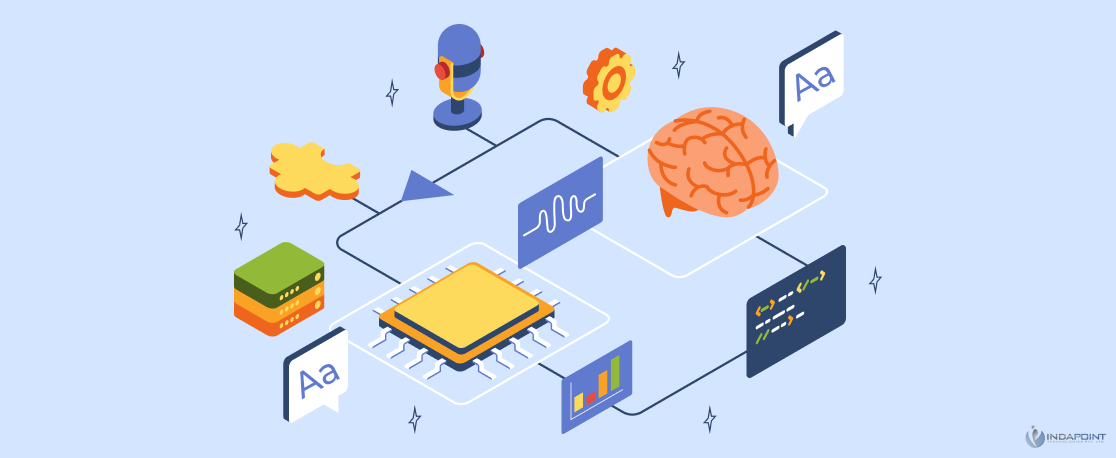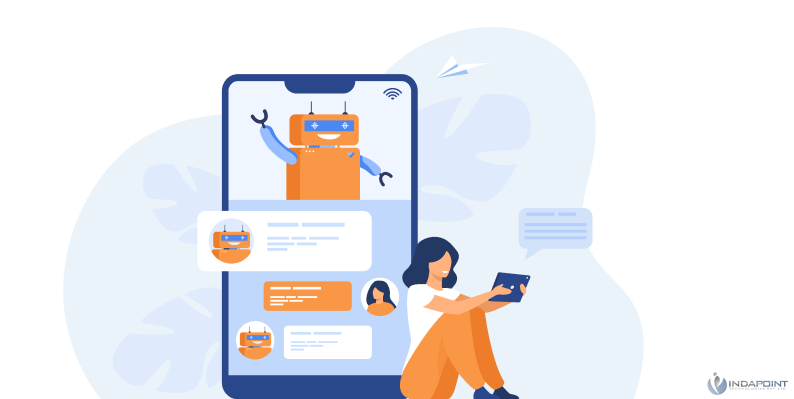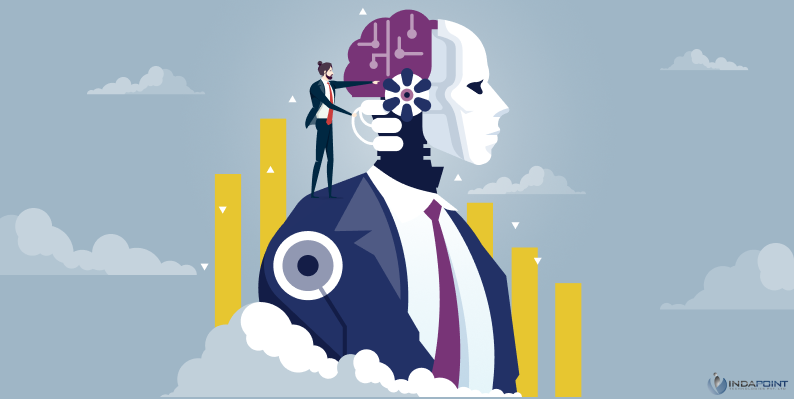The Power of Words: How Large Language Models are Transforming the AI Landscape
October 2, 2023

The complexity of human language has always fascinated the enthralling field of Artificial Intelligence(AI). With the advent of Large Language Models (LLMs), the capacity of machines to comprehend and generate text is on the verge of undergoing a significant paradigm shift. These developments are closing the gap between machine-generated and human-like linguistic capabilities.
Large Language Models (LLMs) are, at their foundation, an innovative subset of AI, supercharged by complex machine learning algorithms and unmatched computational resources. They are distinguished from earlier models by their capacity to process and learn from enormous quantities of textual data. This exposure enables them to discern context, grasp nuanced meanings, and generate coherent and contextually pertinent narratives. It is not an exaggeration to say that it is becoming increasingly difficult to distinguish some outputs from advanced LLMs from human-authored content.
LLMs in Action: Real-World Applications:
The transformative power of LLMs is currently being felt in a vast array of industries and fields. Their ability to comprehend, generate, and interact with human language has made numerous applications possible:
Content Creation
LLMs are redefining the creation of content. In journalism, they aid in the composition of articles, particularly data-driven reports. Creative writers use them for brainstorming sessions, suggestions to surmount writer’s block, and even novel co-writing. In the realm of advertising, LLMs contribute to the creation of memorable slogans and commercials that resonate with audiences.
Customer Service

The age of generic, scripted chatbot responses is ending. Modern chatbots fueled by LLM are more context-aware, individualised, and proactive. They can anticipate common user issues, provide solutions even before a user realises a problem, and manage multiple inquiries concurrently, ensuring that customer support is prompt and efficient.
Research & Education
LLMs are invaluable resources for academics. They contribute to literature evaluations by recommending pertinent papers, summarising lengthy texts, and predicting future research trends based on current data. LLMs can serve as study companions for students by simplifying complex concepts and providing answers to academic questions.
Gaming
LLMs are revolutionising the narrative aspect of video games. Using these models, game designers are creating adaptive storylines in which the narrative of the game changes based on the player’s decisions, ensuring that each player has a unique gaming experience. In addition, LLMs improve in-game interactions by enabling players to converse with game characters in natural language.
Healthcare
LLMs assist medical professionals by analysing patient data, proposing potential diagnoses, and drafting patient correspondence. In addition, they serve as health assistants for users, responding to medical questions and offering general health advice.
Legal Sector
The volume of text in legal documents can be daunting. LLMs aid attorneys by summarising cases, recommending relevant precedents and drafting legal documents based on inputs.
Entertainment
Scriptwriters use LLMs to generate concepts, develop character dialogues, and draft entire scripts. Musicians are utilising LLMs to create song lyrics and, in some cases, complete compositions.
These applications do not even scratch the surface. As LLMs continue to develop and industries realise their potential, we can anticipate an even greater variety of applications, some of which we may still need to consider.
Difficulties and Ethical Factors:
While promising, the rise of LLM degrees raises many challenges and ethical issues that must be addressed.
Bias and Misinformation
By their very nature, LLMs are trained on vast quantities of internet-sourced data. This data reflects our society, with all of its preferences and prejudices. Therefore, LLMs can perpetuate and amplify these biases if not administered appropriately. There have been instances in which LLM outputs displayed racial, gender, or cultural preferences, which can have real-world consequences, mainly when used in decision-making scenarios such as hiring or law enforcement. In addition to refining the model, addressing this challenge requires curating diverse and representative training datasets and perpetually monitoring and refining outputs.
Overdependence

The effectiveness and capability of LLMs can result in overdependence, making us excessively reliant on machine-generated content and solutions. Students may use LLMs to generate essays in educational contexts, thereby missing out on the learning process. In creative disciplines, excessive dependence can inhibit human intuition and creativity. It is essential to establish a balance, using LLMs to augment rather than replace human capabilities.
As the sophistication of LLM-generated content increases, it becomes increasingly difficult to distinguish it from human-generated content. This fuzziness of boundaries raises several ethical concerns:
How do we define authenticity in a world where machines can generate content that simulates experience?
If an LLM student creates a work of art, music, or literature, can it be considered ‘original’? Who possesses the rights to it, if anyone?
Transparency
As businesses and services increasingly employ LLMs, how can they ensure that content sources are disclosed to users? And how do users ensure that the information they receive, particularly in critical areas such as news and medical advice, is accurate and objective?
With LLMs taking over tasks such as content creation, there are potential economic repercussions, particularly in labour markets. How do societies adapt to these shifts and guarantee that the benefits of LLMs are distributed equitably?
As LLMs become increasingly integrated into our daily lives, these challenges and ethical considerations will become the focal point of discussions on AI’s function in society. It is essential that as we advance technologically, our moral, social, and philosophical understanding of these instruments also goes.
As technology continues its relentless march forward, LLMs’ potential applications and evolution appear limitless. Here is a more in-depth examination of some anticipated developments:
Multimodal Models The notion of LLMs is not limited to text alone. Models incorporating multiple data types, such as text, images, videos, and audio, will likely emerge shortly. Imagine an LLM capable of analysing a video, comprehending its content, and generating a comprehensive textual summary. Or contemplate a model that can analyse the mood and tone of a piece of music and then create lyrics that are a perfect match. Such multimodal models would provide a richer, more integrated form of artificial intelligence, bridging the divide between various data mediums and producing more comprehensive results.
The traditional one-size-fits-all education model progressively gives way to more individualised approaches, which personalised learning assistants support. LLMs may be in the vanguard of this revolution. By understanding a student’s learning style, pace, assets, and weaknesses, these AI models could personalise educational content to meet their specific requirements. For example, a student who struggles with algebra may receive more visual and interactive content. In contrast, students who excel in literature may be challenged with more complex texts and analytical tasks. LLMs could also aid in language acquisition by providing real-time corrections and contextual translations, making learning more dynamic and efficient.
AI narratives frequently vacillate between dystopian fears of machines taking over and utopian fantasies of limitless possibilities. The most probable future scenario, however, involves collaboration. With their advanced language skills, LLM graduates could collaborate with professionals from various disciplines. In medicine, they could assist physicians by sifting through enormous amounts of medical literature to recommend treatments. They could assist attorneys in analysing case histories and legal precedents. In the arts, artists may co-create with AI by utilising LLMs for brainstorming sessions, refining creative ideas, or even generating the first manuscripts of novels, scripts, or compositions.
Although speculative, these insights into the future are based on current trends and the rapid advancements in the AI domain. The integration of LLMs into these fields promises a technologically sophisticated lot and one that is more inclusive, efficient, and innovative.
The journey of Large Language Models exemplifies humanity’s never-ending pursuit of knowledge and advancement, as stated in the conclusion. From the earliest days of rudimentary AI algorithms to today’s sophisticated LLMs, we have endeavoured to construct machines that imitate and surpass human capabilities.

The promise of LLMs extends beyond text comprehension and production. It involves the development of machines that can comprehend the underlying emotions, intentions, and stories that influence human experiences. As LLMs penetrate healthcare, education, entertainment, and countless other industries, they have the potential to affect how we communicate, learn, and create profoundly.
However, tremendous power carries with it great responsibility. The ethical considerations and difficulties posed by LLMs serve as a reminder that technology is only as effective as the hands that wield it. We must approach this future with caution and awareness as we stand on the verge of a new era in which human and machine intelligence intertwines.
More is needed to utilise the capabilities of LLMs; we must also guide their development by our societal values and ethics. This ensures that as technology advances, so does the creation of a world in which machines complement human creativity, intuition, and sentiment instead of replacing them. The future of LLMs is a testament to human innovation and a call to action for responsible and enlightened stewardship of technology.
Are You Prepared to Embrace AI’s Future in Your Business?
It can be challenging to navigate the world of Large Language Models and AI, but with the proper partner, the potential is limitless. At IndaPoint, we specialise in leveraging the power of cutting-edge technologies and frameworks such as ChatGPTs, OpenAI, Langchain, and more to deliver custom-tailored solutions based on your specific requirements.
Whether you’re looking to develop a cutting-edge app or integrate AI-powered solutions into your operations, our India-based team of experts is prepared to assist you at every stage. Enter the AI revolution with innovation and self-assurance. Contact us immediately to learn how we can make your vision a reality.





